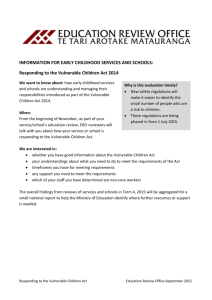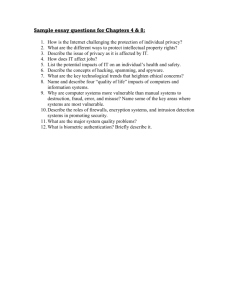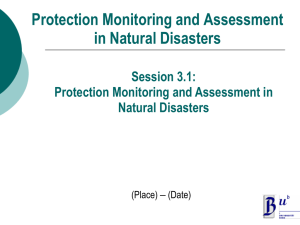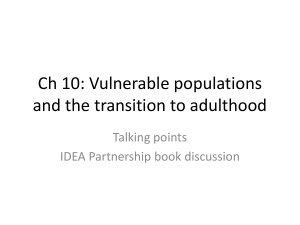VULNERABLE GROUPS POLICY (POLICY NUMBER 12399A)
advertisement
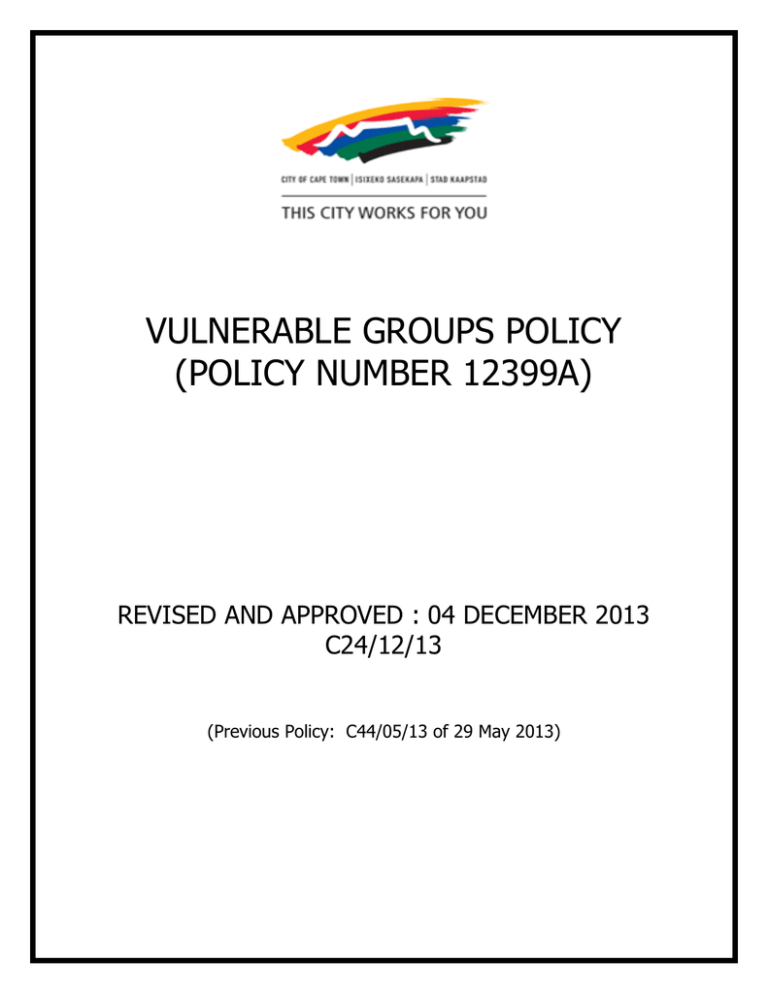
VULNERABLE GROUPS POLICY (POLICY NUMBER 12399A) REVISED AND APPROVED : 04 DECEMBER 2013 C24/12/13 (Previous Policy: C44/05/13 of 29 May 2013) Policy on Vulnerable Groups THE CITY OF CAPE TOWN POLICY September 2013 1 CONTENTS POLICY TITLE ......................................................................................................................................................................... 3 REFERENCE CODES: POLICY NUMBER 12399A ..................................................................................................................... 3 DOCUMENT CONTROL .......................................................................................................................................................... 3 ABBREVIATIONS .................................................................................................................................................................... 3 DEFINITIONS ......................................................................................................................................................................... 3 1. PROBLEM STATEMENT.................................................................................................................................................. 5 1.1 Persons with Disabilities...................................................................................................................................... 5 1.3 Problem Statement on Older Persons ................................................................................................................. 6 1.4 Problem Statement on Vulnerable Children ....................................................................................................... 6 2. DESIRED OUTCOMES..................................................................................................................................................... 7 3. STRATEGIC INTENT ........................................................................................................................................................ 7 3.1 Integrated Development Plan ............................................................................................................................. 7 3.2 City Development Strategy and OneCape2040 Agenda ...................................................................................... 8 3.3 Social Development Strategy .............................................................................................................................. 8 4. POLICY PARAMETERS .................................................................................................................................................... 8 5. ROLE PLAYERS AND STAKEHOLDERS ............................................................................................................................. 9 6. 7. 8. 5.1. Directorate for Social Development and Early Childhood Development ............................................................ 9 5.2 Organisations focussing on the rights and advancement of vulnerable groups. ................................................ 9 5.3 National and Provincial Government .................................................................................................................. 9 REGULATORY CONTEXT ................................................................................................................................................ 9 6.1 The Constitution of the Republic of South Africa, 1996 ...................................................................................... 9 6.2 Local Government: Municipal Systems, 2000 ..................................................................................................... 9 6.3 Other relevant legislation and policy for the various vulnerable groups ............................................................ 9 POLICY DIRECTIVES ..................................................................................................................................................... 10 7.1. Awareness and training programmes as part of a holistic service to a vulnerable groups ............................... 10 7.2 Early intervention training programmes ........................................................................................................... 11 7.3 Networks to promote the rights and advancement of vulnerable groups ....................................................... 12 MONITORING, EVALUATION AND REVIEW ................................................................................................................. 12 2 POLICY TITLE Policy on Vulnerable Groups REFERENCE CODES: POLICY NUMBER 12399A DOCUMENT CONTROL Version: Status: Date: Contact details: E-mail: Tel: Final Final September 2013 Alfonso Sauls Alfonso.Sauls@capetown.gov.za 021 4440301 ABBREVIATIONS CBO CDS CHEC ED IDP NGO SDBIP SDECD SDS WC DSD Community-based Organisations City Development Strategy Cape Higher Education Consortium Executive Director Integrated Development Plan Non-Governmental Organisations Service Delivery Budget Implementation Plan Social Development and Early Childhood Development Directorate Social Development Strategy Western Cape Department of Social Development DEFINITIONS Awareness Raising Ensuring that people notice and understand issues facing vulnerable persons Child Individuals under the age of 18 years Child-headed Household Household of children only, headed by a child City Means the City of Cape Town as established by Provincial Notice 479 of 2000 in terms of section 12 of the Local Government: Municipal Structures Act, 1998 (Act No. 117 of 1998) and includes an employee or person authorised to perform any function in connection with this policy; 3 Disability In 2005, the South African Cabinet adopted the following definition of disability: “Disability is the loss or elimination of opportunities to take part in the life of the community equitably with others that is encountered by persons having physical, sensory, psychological, developmental, learning, neurological or other impairments, which may be permanent, temporary or episodic in nature, thereby causing activity limitations and participation restriction with mainstream society". These barriers may be due to economic, physical, social, attitudinal and/or cultural factors. Empowerment Refers to the process of endeavouring to make an individual conscious of building critical analytical skills for him/her to gain self-confidence in order to take control of his/her life. Gender Awareness Refers to a state of knowledge of the differences in social roles and relations of women and men and how these result in differences in power relations, status, privileges and needs. Gender Equality Refers to a situation where women and men have equal conditions for realizing their full human rights and potential are able to contribute equally to national political, economic, social and cultural development, and benefit equally from the results. Gender equality entails that the underlying causes of discrimination are systematically identified and removed in order to give women and men equal opportunities. The concept of gender equality takes into account women’s existing subordinate positions within social relations and aims at the restructuring of society so as to eradicate male domination. Equality is understood to include both formal equality and substantive equality, not merely simple equality to men. Gender Roles Refers to the social roles allocated to women and to men in particular societies and at particular times. Such roles, and the differences between them, are conditioned by a variety of political, economic, ideological and cultural factors and are characterised in most societies by unequal power relations. Gender is distinguished from sex which is biologically determined. Gender Sensitive Refers to the state of knowledge of the socially constructed differences between women and men, including differences in their needs, as well as to the use of such knowledge to identify and understand the problems arising from such differences and to act purposefully to address them. Older persons Individuals aged 60 years and older. Orphans Children whose mother, father or either biological parents or guardian have died. Vulnerable Groups Vulnerable Groups will include: persons with disabilities, older persons, vulnerable women and orphans Vulnerable Person A person whose survival, care, protection or development may be compromised, due to a particular condition, situation or circumstance and which prevents the fulfilment of his or her rights. 4 PROBLEM STATEMENT Women, persons with disabilities, orphans and older persons are considered vulnerable as they tend to be at higher risk of social exclusion and marginalisation. These groups often face higher rates of victimisation and abuse and tend to be over-represented among the poor, with the experience being more discriminating. Addressing poverty and inequality demands that there is a specific consideration of these vulnerable people and their livelihood strategies. 1.1 Persons with Disabilities 1.1.1 Despite considerable progress made with regards to the legal status of vulnerable groups being entrenched in the Bill of Rights contained in the Constitution of the Republic of South Africa, 1996 often these groups do not, in practice, enjoy equal rights. 1.1.2 Persons with disabilities face serious challenges to participate meaningfully in community activities with regard to access to public institutions and facilities, employment opportunities, appropriate skills training. 1.1.3 Local Government is the sphere of government that is closest to communities. The services that are provided by municipalities to communities can make a significant change in not only the condition, but also the position of persons with disabilities, as well as play a dynamic role in redressing past imbalances in communities. 1.1.4 It is Local Government’s legal responsibility to engage in an approach in all its policies, programmes and projects in order to ensure fairness in the treatment of persons with disabilities and their access to services 1.1.5 Specific measures must be developed to identify and remove the underlying causes of discrimination in policies, laws, procedures, beliefs, practices and attitudes. This can only be achieved from a multidimensional approach that focuses on all aspects pertaining to the development of disabled persons both internal and external to the City of Cape Town. 1.1.6 The South African Human Rights Commission flagged the lack of tolerance and acceptance towards South Africans living with disabilities. They noted that there is: “Lack of an adequate human rights culture of tolerance and acceptance and; that intolerance is aggravated by a general lack of awareness and knowledge about the different types of disability, and the causes and ways of ensuring acceptance of persons with disabilities within communities; that there is still a presence of negative stigmas within communities associated with disability….[in addition] there is an invisibility of persons with disabilities in communities resulting in their specific and special needs not being adequately addressed”. 1.2 1.2.1 Problem Statement on Vulnerable Women and Gender Issues Women have been identified as a vulnerable group as they face discrimination based on entrenched patriarchal and discriminatory gender norms which manifest in a number of ways. Poverty patterns are inherently influenced by gender. Women, particularly Female-headed households are generally much poorer. Inequality is further, intensified by additional race-based discrimination and inequality. 5 1.2.2 Furthermore, women are overrepresented in low-skilled, low-paying jobs and the wage gap in earnings persists, particularly in low and semi-skilled occupations. 1.2.3 The IDP makes specific reference to a Gender Programme in the “Caring City Strategic Focus Area” (SFA) noting that “The City seeks to create an enabling environment for the provision of services that are gender-sensitive”. However the City still needs to give greater effect to this commitment 1.3 Problem Statement on Older Persons 1.3.1 Older persons have been identified as a vulnerable group as many older persons living in the Western Cape have been deprived of adequate education, employment and socio-economic opportunities. Without the means to break free from the bondage of poverty, many older people were unable to provide for their old age through secure retirement benefits or by ensuring that their children would flourish. 1.3.2 In addition, older persons are often more vulnerable to disease, and their health may be affected by poor nutrition, quality access to medical care and poverty. 1.3.3 The absolute number and proportion of older people in South Africa have increased considerably over the past decades. Between 2002 and 2011, the total number of persons over the age of 60 years increased by 35% to 3.9 million. The percentage of older persons increased to 7.7%, making South Africa the country with arguably the largest percentage of older persons on the continent. This figure is expected to increase further over the next decades. The older person population in Western Cape comprised 47% Coloured people, 43% White people, 9.5% Black people and 0.6% Indian/Asian people. 1 1.3.4 The role of older persons in households is continuously being affected by issues such as labour migration, poverty and HIV/AIDS. It is assumed that extended families and the community care for older people, however, many families are simply too disjointed to look after the well-being of older persons.2 In fact, older persons are increasingly required to play an active care and support role in their respective households. The percentage of households headed by older persons in the Western Cape has increased from 17.6% in 2002 to 23.0% in 2011. 3 1.4 Problem Statement on Vulnerable Children 1.4.1 Children have also been identified as a vulnerable group as many continue to live in poverty and are faced with considerable inequalities that continue to inhibit their access to better life opportunities, enhanced educational levels and improved health outcomes. The number of children who have never been in school, or who have dropped out remains a problem.4 1.4.2 According to the 2011 Census, 9.8% of children live in the Western Cape and 19.1% of all children in South Africa are orphans. However, less than 10% of children in the Western Cape were classified as orphans. The deterioration of South African family structures, inter alia as a result of labour migration and poverty, caused many children to grow up and live without their biological parents. 1 Stats SA: Census 2011 Fernandez-Castilla, in Lombard and Kruger, 2009 3 Stats SA: Census 2011 4 Presidency, 2009 2 6 1. 4.3 The percentage of child-headed households in the Western Cape, were 0.2% in 2011. Child-headed households consistently listed remittances as their main source of income between 2002 and 2011. 1. 4.4 31.8% of children in the Western Cape are living in households that experienced inadequate or severely inadequate access to food5. 1. 4.5 Many children within the City of Cape Town are subject to acts of violence and abuse, often with fatal consequences and often by people known to them. The drivers and contributing factors to this are many, varied and sometimes mutually reinforcing. This poses a serious threat to children’s health, development and survival. The City of Cape Town’s duty is to play a leading role in creating an environment where there is no place for, or tolerance of the abuse and exploitation of children. 2. DESIRED OUTCOMES The aims of this Policy are to: 2.1. articulate specific interventions to meet the needs of vulnerable groups; 2.2 ensure the delivery of awareness, development and training programmes in consultation with registered NGOs, CBOs, Provincial DSD, and other spheres of government throughout the City of Cape Town; 2.3 promote and support a cohesive and effective network of structures, organisations and groups focusing on vulnerable groups; 2.4 facilitate the process that the City conducts and utilises research on issues of vulnerable groups to inform the design and delivery of services and strategies; 2.5 guide the collaboration with other spheres of government and more specifically with the Western Cape Provincial Government Department of Social Development to avoid duplication of funding and to contribute towards unity of effort in the delivering of social development services 3. STRATEGIC INTENT 3.1 Integrated Development Plan The IDP of the City is built on five Strategic Focus Areas (SFAs) namely: the Opportunity City, the Safe City, the Caring City, the Inclusive City, and the Well-Run City. These key focus areas inform the Policy on Vulnerable Groups of the City: 3.1.1 Opportunity City, promotes the creation of an enabling environment that would ensure the empowerment of vulnerable groups; 3.1.2 Caring City, promotes the creation of an enabling environment for the provision of services to meet the needs vulnerable groups; 5 Stats SA: Census 2011 7 3.1.3 Inclusive City, promotes Cape Town as a City where all residents feel acknowledged, heard and valued. 3.1.4 Well-run City, promotes the provision of guidelines to policymakers, programme managers and service delivery units of the City about understanding the implications of their work on vulnerable groups and the mainstreaming into all aspects of their operations. 3.2 City Development Strategy and OneCape2040 Agenda The City Development Strategy (CDS) is the 30 year strategy for the City. It is informed by the six ‘transitions’ identified in the OneCape2040 Agenda which articulates the vision for the Western Cape region. This policy is aligned with the: 3.2.1 “Settlement Transition”: The goal of this transition is to build ‘healthy, accessible, livable, multiopportunity communities’. 3.2.2 “Cultural Transition”: The communities that make up the Western Cape are confident, welcoming, inclusive and integrated. 3.3 Social Development Strategy 3.3.1 The Social Development Strategy (SDS) articulates the role of the City in promoting and maximising social development. 3.3.2 The third high-level objective of the SDS is to “support the most vulnerable through enhancing access to infrastructure and social services”. One of the key levers identified to achieve this is to “Champion the inclusion of vulnerable people across the City”. 3.3.3 The governing principal of the SDS which guides this policy is to “Focus especially on individuals and groups that are vulnerable, marginalised or excluded, such as women, people with disabilities, unemployed youth, elderly and very poor people.” 4. POLICY PARAMETERS 4.1 The policy affects all vulnerable groups living in the City of Cape Town. 4.2. The policy does not extend managing to labour relations or diversity issues in the workplace. It does not direct the work of Corporate Services in facilitating the inclusion of vulnerable groups in the City’s corporate structure or setting of affirmative action targets etc. 4.3 This policy guides the work of NGOs or CBOs conducting projects .on behalf of, or in partnership with the City of Cape Town. 4.4 The Policy has transversal implications as the work of the SDECD in mainstreaming the issues of vulnerable people shall impact on other directorates in the future. 8 5. ROLE PLAYERS AND STAKEHOLDERS The following role players are identified for the purpose of implementing the Policy's provisions 5.1. Directorate for Social Development and Early Childhood Development 5.1.1 The Vulnerable Groups Programme in SDECD will be the main implementer and champion the implementation of this policy. 5.1.2 Each unit within the SDECD will develop and report on indicators and targets to promote rights and advancement on vulnerable groups. 5.1.3 The SDECD will facilitate a process to engage with other directorates in order to mainstream the directives of this policy. 5.2 Organisations focussing on the rights and advancement of vulnerable groups. 5.2.1 All interested stakeholders including non-governmental, and community organisations, civil society and research institutions that work to promote the rights and advancement of persons with disabilities, vulnerable women and gender, older persons and vulnerable children are encouraged to provide feedback on this policy and its implementation. 5.3 National and Provincial Government The SDECD will collaborate with other spheres of government and more specifically with the Western Cape Department of Social Development to mainstream the directives of this policy. 6. REGULATORY CONTEXT This Policy draws its mandate from the following national and local instruments. 6.1 The Constitution of the Republic of South Africa, 1996 Section 9 of the Constitution specifically prohibits direct and indirect discrimination, by the state or an individual, against anyone on the basis of race, gender, sex, pregnancy, marital status, ethnic or social origin, colour, sexual orientation, age, disability, religion, conscience, belief, culture, language and birth and it constitutes a Constitutional violation of a person’s right. 6.2 Local Government: Municipal Systems, 2000 Section 17 provides that when establishing mechanisms, processes and procedures, a municipality must take into account the special needs of people who cannot read and write, people with disabilities, women and other disadvantaged groups. This is an indication that community members have the right to the use and enjoyment of public facilities and the right to have access to basic services that municipalities provide. 6.3 Other relevant legislation and policy for the various vulnerable groups 9 6.3.1 Persons with Disabilities Promotion of Equality and Unfair Discrimination Act, No. 4 of 2000 Integrated National Disability Strategy (1997) Disability Framework for Local Government 2009 – 2014 6.3.2 Vulnerable Women and Gender Promotion of Equality and Unfair Discrimination Act, No. 4 of 2000 Domestic Violence Act, No. 116 of 1998 Women Empowerment and Gender Equity Bill 6.3.3 Older persons The Older Persons Act, No. 13 of 2006 Promotion of Equality and Unfair Discrimination Act, No. 4 of 2000 6.3.4 Vulnerable Children Children’s Act, No. 38 of 2005 Child Care Amendment Act, No. 86 of 1991 & 13 of 1999 7. POLICY DIRECTIVES 7.1. Awareness and training programmes as part of a holistic service to a vulnerable groups 7.1.1. The SDECD will implement appropriate awareness campaigns and training programs that aim to change perceptions, attitudes and behaviour, so that the status of vulnerable groups can be improved. This shall be done in consultation with registered NGOs, CBOs, Provincial DSD and other spheres of government. 7.1.2. The SDECD will use existing platforms that will increase the dialogue and profile of issues affecting vulnerable groups so that practical solutions and best practices will emerge to guide the planning and implementation of plans and programmes. 7.1.3. The SDECD will implement and support programmes (awareness, training and preventative) for a safer City. 7.1.4 The SDECD will implement training programmes to capacitate vulnerable groups to get access to the employment opportunities and the mainstream economy. 7.1.5 The following types of programmes will be considered: 7.1. 5.1 Interventions for Vulnerable Children & Orphans may include: programmes to ensure that children, families, care-givers and communities are aware of their rights and responsibilities and the services available to strengthen and support them the celebration of relevant national and international days or months) awareness programmes to prevent violence against children Fatherhood education and training Programmes 10 7.1.5.2. Interventions for Persons with disabilities may include: the celebration of relevant international and national days focussing on persons with disabilities programmes which lobby for the rights of persons with disabilities programmes to ensure that persons with disabilities and communities are aware of their rights of persons with disabilities and the services available to strengthen and support them. 7.1.6 Interventions for Older Persons interventions may include: programmes to ensure that older persons and communities are aware of their rights and the services available to strengthen and support them the celebration of relevant national and international days for older persons awareness programmes to prevent the abuse of Older Persons the provision of integrated and targeted awareness programmes that link older persons to available support services. 7.1.7 Interventions for Vulnerable Women and Gender Issues may include: awareness programmes to focus on the rights of women and gender issues the celebration of relevant national and international days on women and gender issues awareness and empowerment programmes to prevent domestic and gender-based violence 7.2 Early intervention training programmes 7.2.1 SDECD will support the following types of early intervention training programmes in consultation with NGOs registered with Provincial DSD, CBOs and other spheres of government throughout the City of Cape Town 7.2.1.1 Interventions for Vulnerable Children & Orphans may include: targeted family preservation programmes in identified areas targeted marriage and family enrichment programmes in identified areas 7.2.1.2 Intervention for Persons with disabilities may include: targeted life skills programmes for persons with disabilities in identified areas targeted economic development programmes for persons with disabilities in identified areas targeted community outreach projects as respite care and therapeutic services for persons with disabilities in identified areas targeted home-based care projects for persons with disabilities in identified areas through the EPWP 7.2.1.3 Interventions for Older Persons may include targeted community outreach projects such as respite care and therapeutic services for older persons in identified areas mentoring and capacity building for senior clubs in identified areas targeted home-based care projects in identified areas through the EPWP 11 7.3 Networks to promote the rights and advancement of vulnerable groups 7.3.1 SDECD shall promote and support the development of a cohesive and effective network of structures, organisations and groups to promote the rights and advancement of vulnerable groups. 7.3.2 SDECD shall support targeted mechanisms in identified areas that will facilitate the collaboration and inter-connectedness of intergovernmental and government-and-civil society structures to ensure that maximum benefit and impact is derived from the collective efforts. 7.3.3 The SDECD create internal mechanisms to ensure that Directorates within the City collaborate and form partnerships with regard to programmatic and policy issues on vulnerable groups issues. This shall include the creation of mechanism to mainstream the consideration of vulnerable groups issues across City departments 7.3.4 The SDECD shall establish the structures and processes to facilitate how the City utilises research on issues of vulnerable groups to inform the design and delivery of services and strategies. 7.3.5 The SDECD will collaborate with other spheres of government and more specifically with the Western Cape Provincial Government Department of Social Development to avoid duplication of funding and to contribute towards unity of effort in the delivering of social development services. The Implementation Protocol Agreement between the City of Cape Town and the Provincial Department of Social Development will guide this collaboration. 8. MONITORING, EVALUATION AND REVIEW 8.1 The policy will be reviewed every two years or in light of evidence that indicates that this policy is not meeting the outcomes set out in section two. 8.2 Vulnerable Groups forums, networks, structures, etc. and other affected parties may consult with the Vulnerable Groups Programme on the efficacy of this policy and the extent to which it achieves its aims. This will be relayed directly to the Head of SDECD through the appropriate channels. 8.3 The compilation of annual implementation plans will specify details of targets to be reached in the short, medium and long term, and evaluation tools will specify quantitative and qualitative indicators with time frames, which will assist in tracking progress on the achievement of policy objectives. The implementing role players will use these tools in their internal Monitoring & Evaluation process by providing regular reports on policy and programme performance. 8.4 Vulnerable Groups of the City as primary stakeholders and beneficiaries of this policy must play an active role in the Monitoring & Evaluation process. This will be attained through embarking on research such as impact assessments, customer satisfaction surveys, and opinion polls targeting the Vulnerable Groups population. 12
